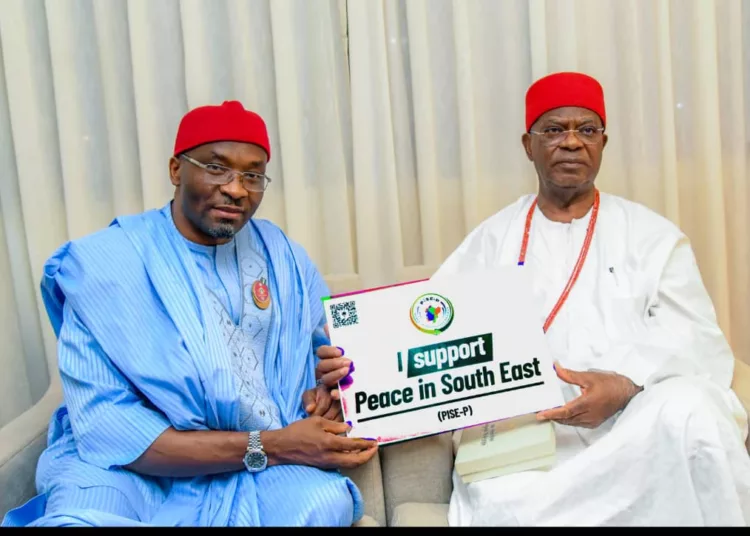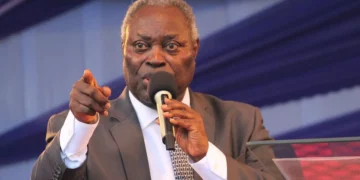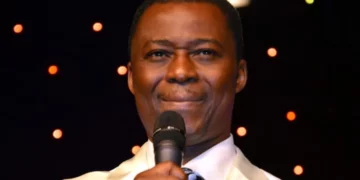Peace in South East Project (PISE-P), an initiative of the Deputy Speaker of the House of Representatives, Rt. Hon. Benjamin Okezie Kalu, was unveiled in the ancient town of Bende, Abia State, on 29 December 2023. The unveiling, which was also used as a grand reception/homecoming of the Deputy Speaker, attracted many eminent Nigerians from the South-East and beyond, including President Bola Tinubu, who was represented by the Vice President, Kashim Shettima.
In his speech, the Deputy Speaker said the objectives of the PISE-P include promoting the use of non-kinetic (non-military) approach to the insecurity challenges in the South-East as well as facilitating reconciliation among communities and individuals affected by past conflicts. He contended that “the journey towards peace is not a destination. It is an ongoing process, one that requires our unflinching commitment and dedication.”.
In a very impassioned speech at the occasion, the Vice President, speaking for President Tinubu, observed that “the terror groups that have held the South East to ransom are not a creation of the people of the region, or of Nigerians from other parts of the country.” For him the “problem we are here to solve as a community, as an Umunna, is a creation of self-serving criminals who do not represent the interests of the Ndi-Igbo and Nigerians….” The Chairman of the South-East Governors Forum and Imo State governor, Senator Hope Uzodinma expressed concerns over the pervasive insecurity in the South East and welcomed the PISE-P initiative.
There are several observations from the unveiling of the PISE-P:
One, there is no doubt that the South- East urgently needs peace and security today more than at any other time since the Civil War. To this extent, the PISE-P is a welcome addition to the number of peace initiatives floated recently in and for the geopolitical zone. The problem however is that quite often many of such initiatives fizzle out after the media headlines. One may for instance want to ask of what has become of the South-East Economic and Security Summit, which was organized under the auspices of the South East Governors’ Forum, in Owerri, Imo State from 28- 29 September 2023 with the theme, ‘South East Beyond 2023: Time for a Reset’? What has become of the Secretariat for the Southeast Governors Fprum, which was announced with fanfare (and is headed by Senator Uche Ekwunife) to coordinate and drive initiatives for the geopolitical zone? And what has become of the Ebubeagu, which was created to tackle the security challenges in the South East? Following from this, a major problem for the PISE-P will be that of institutionalization: how does it survive beyond the headlines and beyond the tenure of Rt Honourable Benjamin Kalu as the Deputy Speaker of the House of Representatives?
Two, while security is a primary concern in the South East (like most parts of the country), there is equally another compelling challenge – the South-East Igbo quest for a re-affirmation of its identity in the country – often from the baseline of their identity before the Civil War. It is true that there are many Igbos who are not from the South East. However, a good number of these, seem to have consciously dissolved their Igbo identity to their new enclaves and states where they are located (especially in the current era of Igbophobia). This means that while most South East Igbos and their cousins in other states of the federation respect and admire each other (even if not always openly) they may not be on the same page in their search for identity affirmation.
Three, I regard the perennial agitation for a presidency of Igbo extraction and separatist agitations for Biafra as part of this masked search for identity affirmation. But the Igbo are not alone in this. Just like some groups in the North (especially Benue and Plateau states) struggle on whether to locate their identity in the North or elsewhere, there are also internal conversations on where to locate Igbo identity: while it seems that most Igbo favour locating their Igbo identity in Nigeria provided they are not discriminated against on account of the Civil war, some, especially the younger ones, believe that they are better off having their own country. There are within the two groups disagreements on strategies. Those pushing for a President of Igbo extraction seem to believe that it will blunt separatist agitations or that it will be an indication of full closure to the Civil War.
Four, some seem to have turned the quest for a President of South East Igbo extraction as an obsession, unwittingly providing an opportunity for some to have a dig on the group under the guise offering unsolicited advice. For instance, when most of the states in the South East were under the PDP, they were told they played “bad politics” by putting all their eggs in one basket. Now that four parties control the five states in the zone, they are also told that four parties governing five states is a sign of being divided. Another common patronizing gibberish is to tell them to “play the right politics” and “build bridges” (often using the South-West and the North as models).
But what is forgotten is that apart from 2015, the South East has been criticised for playing politics being at the centre ( the goat follows the man with the palm frond). It should also be recalled that Awolowo went into alliance with the North during the Civil war – just as Tinubu did with the APC. While it did not result in Awolowo achieving his dream of being the President it worked for Tinubu largely because there was a Buhari who had a guaranteed vote bank in the North and who needed a Tinubu who had a substantial leverage in the South West. There was also the Northern Governors who insisted that an agreement purportedly reached with Tinubu should be respected.
In essence, the whole talk of any group playing smarter politics than others, is gibberish and patronising because as the Book of Ecclesiastes would put it: “I returned, and saw under the sun, that the race is not to the swift, nor the battle to the strong, neither yet bread to the wise, nor yet riches to men of understanding, nor yet favour to men of skill; but time and chance happened to them all.” This is not to discountenance the role of planning in the quest for power because luck is the point where preparation meets opportunity.
Five, owing to the Civil War and the war propaganda of hate and deception on both sides of the conflict, it is natural that an Igbo candidate for the Presidency will not only have to work as twice hard as others to gain the confidence of other parts of the country but also hope for that critical element of luck. Germany, Italy and Japan which were members of the Axis coalition during the Second World war that ended in 1945 (more than 78 years ago) are still viewed with various degrees of suspicions in Europe, especially when they engage in military build-ups. I also feel that the importance of having a President of Igbo or any ethnic extraction is exaggerated – as much as it may bring psychological satisfaction to the ethnic group, it could also paradoxically worsen the profiling of that ethnic group as we saw with the profiling of the Fulani under Buhari. Also contrary to what some people believe, producing the President does not guarantee that your ethnic group will develop more than others (however nepotistic the government wants to be) because development is driven by people and private enterprises, not by the government.
Six, I will argue that the Igbo of the South East is in its Third wave of the search for identity since 1970 when the Civil War ended. The first wave was at the end of the Civil War when, because of the deprivations they suffered during war, pursuit of money became almost an end in itself. During this phase, one of the first things people did when they make money is to go and build ‘mansions’ in their villages. The ‘mansions’ also served as social capital in the achievement oriented Igbo culture. They are also seen as ‘statements’ to one’s kindred that no matter how long the owners may live outside the village, they plan to return and settle there someday. It can be argued that this wave lost its steam to a second wave where we have passive investments like hotels and acquisition of large farmlands that are not maximally utilized by the nouveaux riche. The Third Wave which is still in its infancy, appears to be the taking of innovation and business processes back to the South East by Igbos living outside the zone. This wave, which can be said to be inspired by the likes of Innoson living in Nnewi but producing for the Nigerian and global markets as well as the perceived rising Igbophobia in the country, is witnessing heightened activities by individuals trying to turn things around in their communities but remaining away, as if they are waiting for something to happen – before they can do more. This is where initiatives like PISE-P can come in.
__________
Jideofor Adibe is Professor of Political Science and International Relations at Nasarawa State University, Keffi and Extraordinary Professor of Government Studies at North Western University, Mafikeng South Africa. He is also the founder of Adonis & Abbey Publishers (www.adonis-abbey.com) and publisher of the online newspaper, The News Chronicle (www.thenews-chronicle.com). He can be reached on 0705 807 8841(Text or WhatsApp only).





